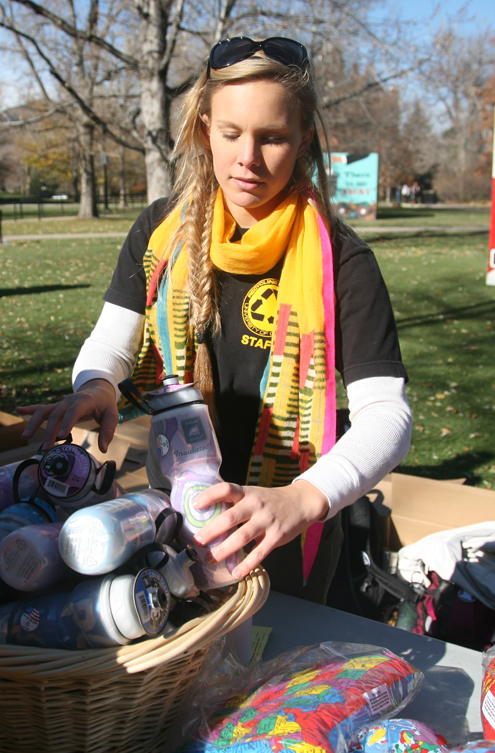
On Earth Day in 1970, a group of dedicated students on the University of Colorado Boulder campus did something unprecedented. They created the first-ever student-facilitated and -organized environmental center. In years following, CU-Boulder students would continue to make history by creating and demanding more sustainable actions from their university. In 1973, they would be the first to create a comprehensive recycling program. In 1991, students would vote to have the first university-wide, mandated bus pass. In 2000, students would, again, vote to use student fees to purchase renewable energy credits to offset carbon-intensive energy sources with wind power. And, in 2008, CU became the first major athletic program to implement a zero-waste goal in a NCCA Division I sports stadium.
Other concerned students enrolled in institutions of higher education caught the CU sustainable fever and have since convened in numbers to ask their schools to make more sustainable choices and implement programs to improve environmental literacy and behaviors.
“The reason we [the staff of CU-Boulder’s Environmental Center] commit ourselves to student leadership is because of their innovation and willingness to think big,” says Sarah Dawn Haynes, programs assistant at CU-Boulder’s now student- and staff-facilitated Environmental Center. “They don’t know the rules yet, so they really do think outside of the box.”
Most recently, student members of CU’s Boulder and Denver campuses have joined the efforts of students on more than 180 campuses nationally to engage in a divestment campaign that asks their schools to discontinue their endowments of fossil fuel companies. The effort was inspired by a Fossil Free campaign promoted by 350.org, a climate action group founded by Bill McKibben, who spoke at CU on Dec. 2.
Student leaders say that they are urging the University of Colorado school system to reallocate the roughly $24 million that the university is known to have directly invested in oil, gas and coal companies, according to figures from the CU Foundation, the institution that manages and invests university funds.
“The moral implications are clear,” Simon Mostafa, a graduate student in environmental engineering at CU, said in a press release announcing the launch of the campaign. “We do not want to profit from corporations whose practices are at odds with CU’s principles of environmental and social responsibility.”
All these student-led initiatives make it clear that students care a lot about sustainability, environmental and social responsibility, and are taking significant actions that follow the footsteps created by CU students more than 40 years ago.
“Sustainability is a huge buzz word on campus,” says junior Matt Ribarich, CU’s director of sustainability for student government. “And, it’s not only used by the environmental studies students anymore. It’s now being incorporated into most majors and disciplines. Students really care.
“I think that university campuses have long been a signal for the direction that a generation will lead the country,” says Dan Omasta, who graduated from CU in 2011 with a political science degree and who served as the director of sustainability for student government in his junior and senior years. “The power of students to provide guidelines for social and environmental change is tremendous.”
Among the issues students have undertaken is a push to incorporate sustainably grown and locally sourced food at places on campus.
At CU, a coalition of students formed to work with Chancellor Phil DiStefano to create a Fair Food Statement of Values, which “seeks to enhance the sustainability experience of our students, faculty, staff and visitors by providing food that is healthy for people and our planet.”
“Right off, one of the biggest demands I see from students comes from an environmental justice side of this,” says Omasta. Omasta, who also helped create the university’s Fair Food Statement, started a consulting business after graduation and is currently working with the university’s Housing and Dining Services to draft a sustainable dining plan.
“Students are really asking for fair food,” continues Omasta. “They’re asking that all food on campus comes from suppliers that provide a decent living wage and safe working conditions for all employees, from farm to delivery.”
At Naropa, students can also find their way to a Garden Café, which offers food grown on campus by students.
“Food is something that is important to the whole campus,” says Ayries Blanck, a senior at Naropa and the school’s student sustainability coordinator. “The individuals who are attracted to Naropa care about being more sustainable. We care about eating local food and want to engage in environmental issues.”
Naropa students also created the Bike Shack, which provides free bike rentals.
“Students are coming together in a number of ways to promote sustainable living and sustainable food practices. It has been an amazing experience to witness the passions people have for local food,” says Brody. “CU Going Local is a student group that provides a resource for CU students to learn what it means to grow food, and are able to apply what they learn by partaking in the gardening process at our student gardens located on the Hill.”
Students are working to reduce waste on campus through increased recycling and composting efforts, and Naropa and CU students have asked that their schools set zero-waste goals. CU students are now also asking that the school adopt a policy that removes all single-serving plastic bottles on campus, and the university has set a goal to divert 90 percent of waste from landfills by 2020, says Ribarich.
Students on Front Range Community College’s Boulder campus are also taking action to mitigate campus waste. Although the school does not yet have a recycling program, last spring, students created their own by designating certain bins to be used only for recyclables. In just a semester, this action increased recycling by 90 percent, says John Feeley, the school’s public relations director.
Based on this student-initiated behavior, the school is now currently in consultation with Waste Management to discuss recycling and composting options on campus.
Respond: [email protected]














